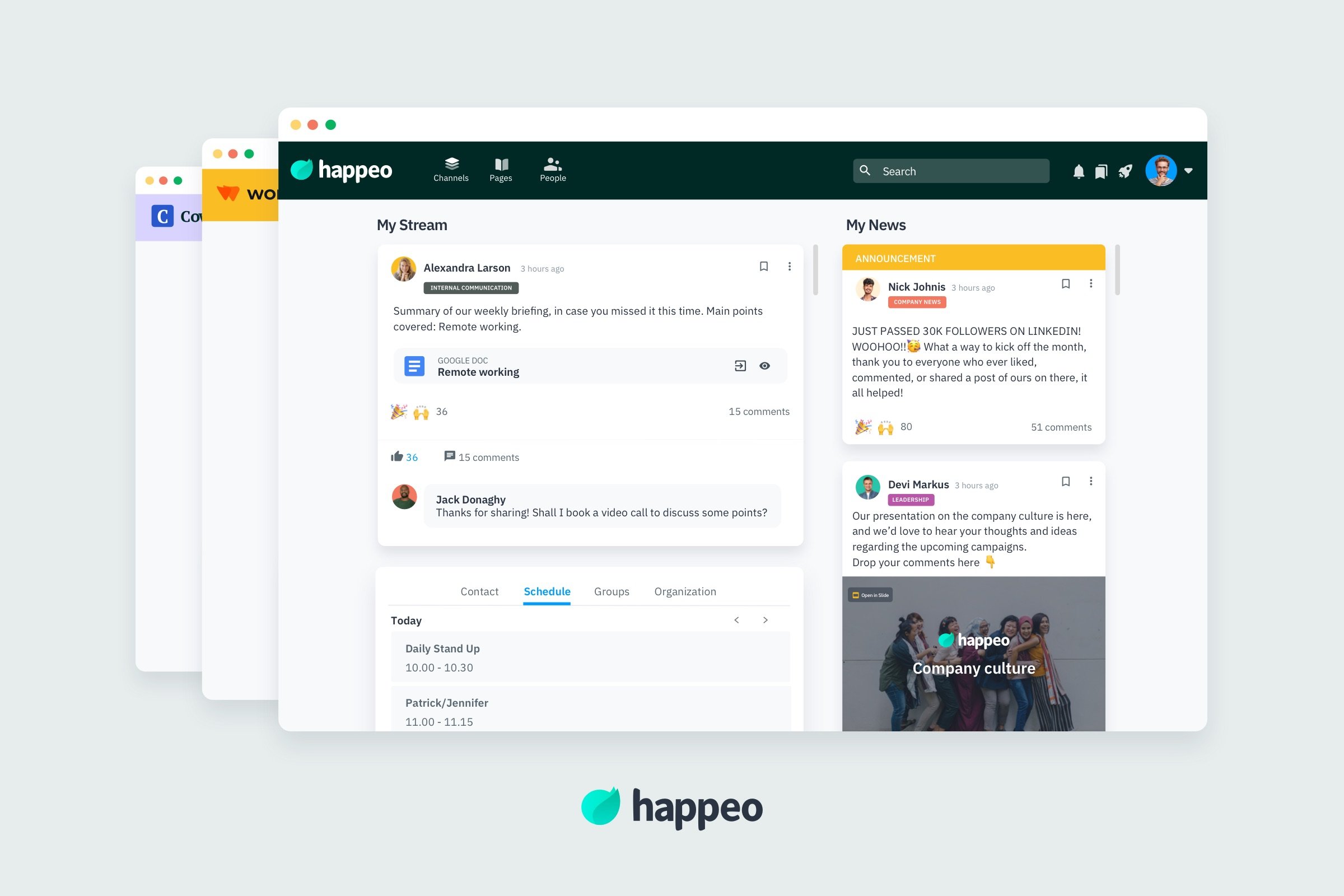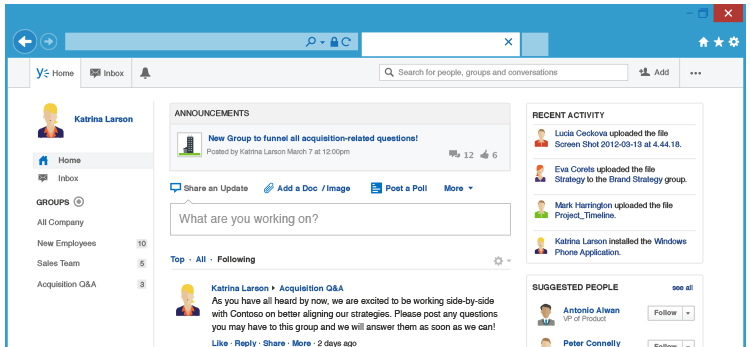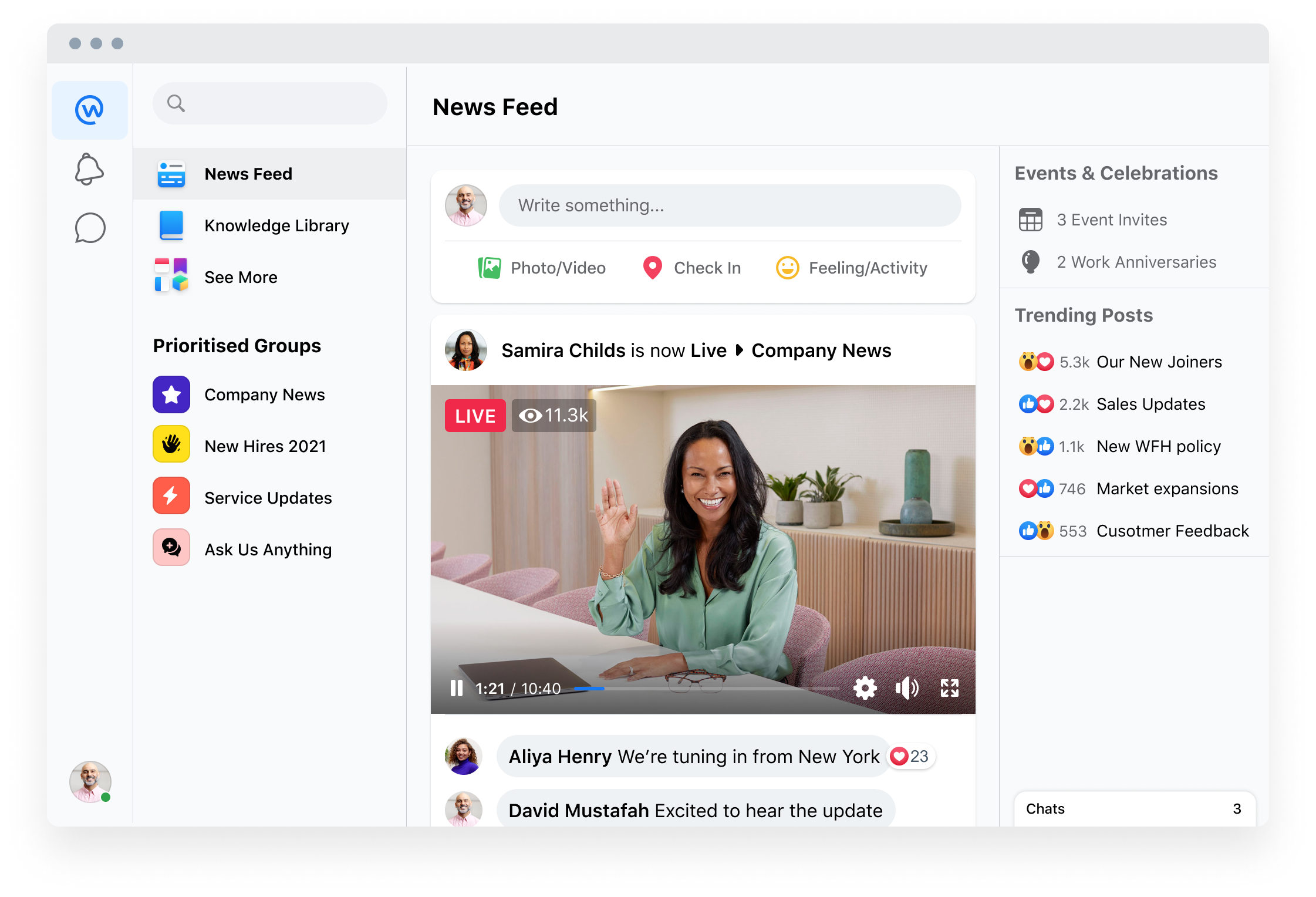
Internal Communications Featured
What is an Enterprise Social Network? (and why you need one)

13 mins read
Start building your digital home with Happeo
Request a demoInternal Communications Featured
Product
Features
Solutions
Happeo for
Use cases
Resources
Explore
Support
Available now
Happeo For
Use cases
Comparisons
Explore
Support
Recent

Jonathan Davies
13 mins read
Enterprise social network tools are not a new invention. A study from McKinsey in 2012 found that 72% of organizations were already using social technologies of some kind, even ten years ago.
However, the same report suggested that few of them were using these tools to their full potential. And seismic changes to the way we work over the past few years mean that enterprise social tools have changed too — and are now more powerful than ever.
If you’re not yet leveraging the power of social collaboration for your organization, you could be missing out on big results.
An enterprise social network (ESN) is a private social network that’s only accessible to the members of an organization. ESNs include various tools that allow employees to connect with each other, share content, and stay up to date on the latest company news. Crucially, they also allow employees to get to know each other on a personal, social level, unlike a traditional employee intranet platform.
Enterprise social networks are not the same as external-facing social networks like Facebook, Twitter, or LinkedIn, although they may be built to look and function similarly. The main difference between these platforms and an enterprise social network is that an ESN can only be accessed by the employees of a particular organization. ESNs are built with the business world in mind, which means they have a focus on seamless, secure communication and tools that enhance collaboration.
Here are some of the benefits of using a social network at work:
An enterprise social network can function as a knowledge base where any employee can go to find the information or files they need. This streamlines document management and makes it easier for employees to do their best work, without wasting hours looking for information.
Using an ESN in this way can also improve your onboarding process, as it allows you to quickly get new starters up to speed by giving them access to all the information they need in one central location.
Suffering from lengthy email threads and endless inbox clutter? An ESN can help. Employees can use them to chat in real time via integrated IM tools or have concise conversations that are displayed to everyone in a clear, threaded feed.
Since these feeds are public within the organization, they can even help other employees working on similar projects or problems down the line (especially when your ESN comes with a strong search functionality).
In many organizations, employees use multiple different tech tools every day to find information, communicate with colleagues, and collaborate on work. This requires constant “context-switching” throughout the day, which can waste a lot of time.
When you use an enterprise social network that integrates well with other popular work tools like Slack, Google Drive, and Microsoft SharePoint, employees can access everything all in one place. This allows them to work more productively and efficiently.
In today’s world, many of us have barely met our coworkers face to face, and it can be difficult to even know who to ask when we have a question.
But according to a study by the Harvard Business Review, employees who used social tools at work were 31% more likely to find coworkers with the right expertise to help them with a job goal, and 88% more likely to know who could put them in touch with the right person.
This is due to features like employee directories and profiles where employees can list their specific skills, knowledge, and expertise — so if you need to find a marketing expert who also speaks Korean, your ESN is the place to look.
A strong corporate culture can have a huge impact on employee engagement, productivity, and retention. And, while an ESN can’t build your corporate culture for you, it can help you to emphasize it, especially to new and remote employees.
Reading and participating in conversations with colleagues can help new employees to understand a company’s culture. And the fact that anyone can use the ESN to communicate with each other also creates a culture of openness and feedback, which can help employees to feel valued.
Using an enterprise social network can also have some disadvantages. For example:
Many work social networks are modeled after the social media platforms we’re all already used to, like Facebook, Twitter, and LinkedIn. While this shortens the learning curve for employees, it also means that there’s often not much capability in terms of uploading, storing, and searching for company documents. Organizations often need to pair their ESN with another solution to facilitate document management.
While there may be a whole wealth of information, insights, and past conversations stored on your ESN platform, that’s not much use if you can’t find it — which is often the case. Most ESN solutions do have some search functionality, but this is often not very powerful or intuitive and may involve manually looking through old conversations to find the answer you need.
Enterprise social networks allow employees to receive notifications from anywhere, on any device. This can be extremely useful — but it can also be annoying. In fact, one study in 2019 found that employees who had their work chat app on their mobile phones reported being distracted by non-work conversations for 16 extra minutes every day — that’s five hours of lost time every month.
If you want to implement an enterprise social network for your company, there are a lot of choices out there. It can be difficult to know which solution will offer you the enhanced collaboration, communication, and social connection that you need.
Here are some of the key features to look for in an enterprise social network solution:
The most effective ESN solutions come with a mobile app, meaning employees can access it even when they’re working remotely or on the road. This is a particularly important feature for companies with large numbers of deskless employees, such as delivery drivers or technicians. Happeo, for example, comes with a mobile app that allows employees to securely connect and engage with each other from anywhere, on any device.
The whole point of an enterprise social network is to encourage communication between employees. This means you should look for a solution that comes with useful features like posts, reactions, comments, and notifications. It should also be easy and pleasant to use, or you’ll probably see low adoption rates. You can also ask your employees what features they’d like to see before choosing which ESN to use.
An ESN should provide easy ways for colleagues to collaborate and socialize together. With Happeo, for example, communication takes place in Channels, which are digital workspaces where anyone can contribute by sending messages, liking posts, and posting comments. You can set up Channels for different teams, departments, or projects — or even for more social groups, like football fans or employees with pets.
Every employee is different, and their experience using your ESN should reflect this. Look for options that let you customize the various feeds and notifications each employee sees to those best suited to them — like Happeo, for example. With Happeo, you can easily create beautiful custom homepages for each employee, that show them the Channels, feeds, and dynamic widgets that are useful for them.
In large, international, remote, or hybrid organizations, it can be difficult to understand who everyone is and how they fit into the company’s structure. Thankfully, many ESNs come with employee profiles and directories, so you can quickly look up a colleague, visualize connections, and find out who’s who. With Happeo, you can even use your Google Workspace data to automatically create a directory and org chart that’s always synced and up to date.
When you implement a new tool or piece of software, you need to make sure it will work alongside the tools your team is already using, or you’ll likely see low adoption rates. Depending on your organization’s existing tech stack, you might want to look for ESN tools that integrate with Google Workspace, Microsoft 365, or other common workplace tools.
Analytics that allow you to track employee and content engagement are a useful way of assessing how your enterprise social network is working. For example, even if you can see the platform is being well-used, digging down into the details could reveal that only a handful of employees are actually contributing. Once you have this information, you can explore ways to get more people engaged — increasing the effectiveness of your ESN.
Here are a few of the best enterprise social networking solutions on the market, to help you make the right choice for your organization:

Happeo is a feature-packed employee intranet, knowledge management solution, and enterprise social network, wrapped up in one user-friendly interface that’s designed make your team happier at work.
Team collaboration happens in Channels, where employees can share posts and react to them with emojis and comments. People is Happeo’s employee directory, where you can find detailed information about your colleagues, wherever they’re based — making it easier than ever to collaborate and communicate across borders.
Each employee’s intranet experience is enhanced by a personalized home page, where they can see the Channels, feeds, and content that’s most important to them as soon as they log on in the morning. And Advanced Analytics features let you find out what content people are accessing, and who the movers and shakers are in your organization.
Key networking features:

“We needed a solution like Happeo because in our fast growing business, information was easily getting misplaced and our employees were loosing time trying to find what they needed to get their job done. We chose Happeo because of its great user reviews, user friendliness and deep integrations with Jira, Sharepoint files and OneDrive."
Joakim Rosdahl
Sysarb’s CPO

Google Workspace is technically not an enterprise social network, but a set of collaboration and communication tools that organizations can use to work together from a distance. However, it does have some features that mean it could be included in this category.
For example, Google Chat means that you can send a colleague a quick message in an instant, and it's easy to check their availability in their Google Calendar, and even hop on a call using Meet.
You can also use Google Workspace to create, edit, and update an employee directory and employee profiles, making it easier for everyone to find the person they need.
Key networking features:
While Google Workspace does have some social features, it’s not really a social network. To get a truly powerful experience out of this collection of tools, look for ESNs that combine the social features you need with a strong Google Workspace integration — like Happeo.
Thanks to Happeo’s Google Workspace integration, you can use your favorite Google apps right within Happeo’s interface, control access to Channels and Pages through Google Groups, and transform your Google data into a beautiful org chart. Using Google Workspace tools through Happeo can even boost your Workspace adoption by as much as 13%.

Yammer is an enterprise social network owned by Microsoft, which allows users to chat and share content. Its Facebook-like interface is simple and user-friendly, and employees can join specific “communities” to stay connected to their teams and departments.
Since it’s owned by Microsoft, Yammer works smoothly with other Office 365 products, meaning teammates can share and collaborate on documents from within the platform. There’s also a mobile app so you can stay a part of the conversation when you’re away from your desk.
Key networking features:

Workplace is a collaboration platform built by Meta (formerly Facebook), designed for the business world. Its interface is similar to Facebook, which means it will likely be familiar to most people, and employees can share posts, photos, videos, or links and react to them in much the same way.
You can ensure everyone has access to the information they need and an easy way to chat about their work by creating groups for each department or project team. And the employee directory and private messaging let you search across your organization and send a message to anyone in a few clicks.
Key networking features:
In this new world of work, where so many of us are still working from our kitchen tables, it's more important than ever for organizations to have the tools they need to connect their people together. And, while tools like Google Workspace are vital to ensuring effective collaboration from a distance, facilitating social connection is just as important.
By implementing a platform like Happeo, you can get the best of both worlds, combining social features that people actually want to use with the tools you need for efficient collaboration and productive work.
Book a free demo to find out how Happeo’s social intranet could transform the way you work.
